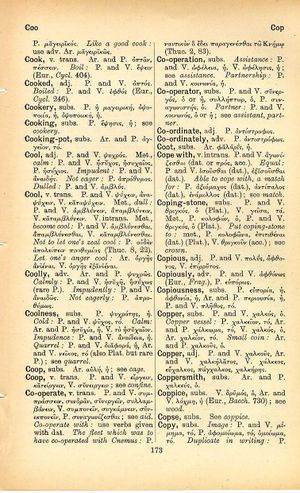co-operate: Difference between revisions
From LSJ
καλῶς γέ μου τὸν υἱὸν ὦ Στιλβωνίδη εὑρὼν ἀπιόντ' ἀπὸ γυμνασίου λελουμένον οὐκ ἔκυσας, οὐ προσεῖπας, οὐ προσηγάγου, οὐκ ὠρχιπέδισας, ὢν ἐμοὶ πατρικὸς φίλος → Ah! Is this well done, Stilbonides? You met my son coming from the bath after the gymnasium and you neither spoke to him, nor kissed him, nor took him with you, nor ever once felt his balls. Would anyone call you an old friend of mine?
m (Woodhouse1 replacement) |
mNo edit summary |
||
| Line 7: | Line 7: | ||
[[co-operate with]]: use verbs given with dat. | [[co-operate with]]: use verbs given with dat. | ||
[[the fleet which was to have co-operated with Cnemus]]: [[prose|P.]] [[ναυτικὸν ὃ ἔδει παραγενέσθαι | [[the fleet which was to have co-operated with Cnemus]]: [[prose|P.]] [[ναυτικὸν ὃ ἔδει παραγενέσθαι τῷ Κνήμῳ]] ([[Thucydides|Thuc.]] 2, 83). | ||
}} | }} | ||
Revision as of 10:38, 3 October 2020
English > Greek (Woodhouse)
verb transitive
P. and V. συμπράσσειν, συνδρᾶν, συνεργεῖν, συλλαμβάνειν, V. συμπονεῖν, συγκάμνειν, συνεκπονεῖν, P. συναγωνίζεσθαι; see aid.
co-operate with: use verbs given with dat.
the fleet which was to have co-operated with Cnemus: P. ναυτικὸν ὃ ἔδει παραγενέσθαι τῷ Κνήμῳ (Thuc. 2, 83).

